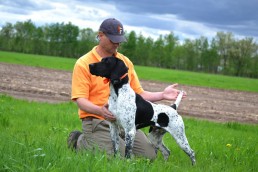SHARE THIS POST
by Passion for the Hunt
How do you keep your hunting dog sharp this offseason?
Chad Hines, owner of Willow Creek Kennels and Hunting out of Little Falls, Minn., is offering some insight from his proven and successful offseason training regimen. Hines is an accomplished dog trainer and breeder of registered German shorthair pointers, but his knowledge extends to all hunting breeds.
“Conditioning your dog is key to effective training,” Hines says.
He adds that dogs not in good condition are prone to numbers of injuries that can cause setbacks. Healthy dogs not only train better, but also hunt better because stamina is important to hunting. Many dog owners walk or run with their dogs.
“Roading” is an effective way many professional trainers exercise dogs for top physical conditioning.
Use a harness to hook up the dog to a vehicle like a golf cart or UTV. Simply drive slowly while the dog runs next to your vehicle, keeping an eye on him as much as the path you’re on. A quiet gravel road is safer and can work well along with any trail, but stay away from pavement or concrete. Larger dogs that are in shape shouldn’t have an issue running up to 8 to 10 miles a day, but still, ease these and dogs in less good shape into the repetition and work your dog progressively over time.
Besides the cardio advantages, Hines says this training will naturally wear down the nails.
“Many large hunting breeds need this physical activity and will be not only be in better shape physically, but also mentally.”
Back to basics
Spring training is a perfect time to get back to basics. Hines recommends lots of yard work with food rewards and positive reinforcement training for your pet.
He says to bring out the place boards and work on the basics, and stresses the importance of taking small steps with your dog.
Are you enjoying this post?
You can be among the first to get the latest info on where to go, what to use and how to use it!
“Obedience and steadiness should be a top priority using positive reinforcement.”
Check cords should be incorporated with place-board training for added control when necessary.
Hines says in every training situation, the handler should make movements with the dog. Dogs are great learners and will pick up on body language. He added that at times no verbal communication is necessary when a dog knows what to do based on the human’s body language.
Preventing gun shyness
Gunfire conditioning can be delicate. Be creative and start with a small cap gun for a soft approach. Only display and fire a weapon around the dog directly before some form of reward is given. Step outside the vehicle where a dog can watch you raise and fire a cap gun then turn around and open the door for them to run around and play. Repetition of this will soon have a dog excited about the crack of a gun and eliminate the shyness around gunfire.
Hunting familiarity and repetition
Hines says to embrace any hunting situation during the offseason that can get your dog fieldwork. He says trails and preserves can create these field atmospheres. Also, pigeon hunting is an underappreciated activity that offers great sporting action for hunters as well as work for hunting dogs at times when nothing else is in season. Like waterfowl, pigeon fields can be scouted and a simple blind setup with a few spinning wing decoys will make for some great shooting action at times.
Hines says keeping a dog sharp and conditioned for live hunting situations should include training exercises that replicate those situations.
“Shooting a few pigeons in a field for a dog to mark and retrieve is great training exercise.”
Planting chukars, pigeons, pheasants or quail to create hunting situations is also great repetition for breaking up the training routine.
“These training situations don’t necessarily have to be long or intense through the offseason; just keep your dog exposed to the basics,” Hines said. “Focus on obedience and conditioning and both you and your dog will have a much more memorable hunting season.”
For more information, contact Chad Hines at willowcreekkennels@hotmail.com or visit willowcreekkennels.net.
MWO
SHARE THIS POST
Did you enjoy this post?
You can be among the first to get the latest info on where to go, what to use and how to use it!
MWO
We believe being outdoors is good. With more than 1,000 articles each year, MidWest Outdoors magazine is all about sharing outdoor experiences with you—where to go, what to use and how to use it… whether you’re close to home or on that trip of a lifetime.



